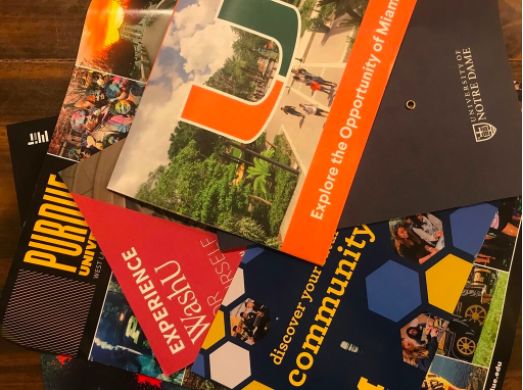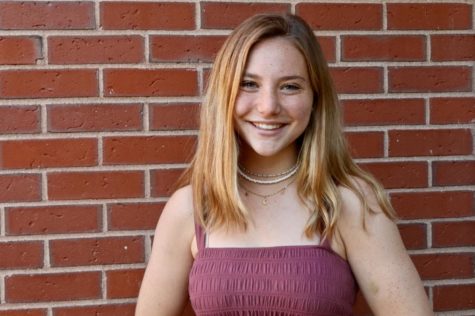COVID-19 and the class of ’21: a new approach to college admissions

Credit: Courtesy of Joyce Wu
Due to COVID-19, the college admissions process is going to look exceptionally different for the class of 2021 and possibly many classes in the future. “Whether you’re in your sophomore year or you’re a junior or a freshman, we know that this is going to be a really strange place on most transcripts,” Strategic Advisor for Admission and Financial Aid at Williams College Twink Williams Burns, said.
May 19, 2020
With colleges and universities closed due to COVID-19, many students approaching their senior year are wondering, “what will the application process look like for me?” With SAT and ACT tests canceled or postponed and college campuses closed, the application process is bound to be exceptionally different than in years past.
Grant Gosselin, Dean of Admissions at Boston College, warns upcoming applicants to be mindful while exploring schools via the internet.
“I would encourage all students to be cautious and informed consumers with tools such as College Confidential,” Gosselin said.
With college campuses closed, many juniors have not been able to tour the schools that they’re interested in. Instead, many have turned to use College Confidential, a website that shows students quick facts on size, location, top majors and more about different schools. However, Gosselin advises students to be careful when using websites like this since they are not always accurate.
“Many colleges and universities will provide resources to engage with current students through email, phone or chat,” Gosselin said.
Gosselin recommends for prospective applicants to ask their potential schools to connect them with a current, enrolled student. Conversing with a student who attends the school can give the applicant a more accurate view of the environment and lifestyle of that interested school. Another concern for many high schoolers is missing multiple months of their sport, band or other extracurricular activity.
Leykia Nulan, Dean of Admissions at Mount Holyoke College, stresses that everyone is going through this pandemic together.
“As admissions counselors, we will start to get into a habit of going ‘oh, COVID-19. This makes sense that there is a gap here because we were all at home’,” Nulan said. “We totally understand the situation, and we don’t plan on holding that against anyone.”
Nulan wants students to know that the admissions offices are going to be empathetic towards students, acknowledging that COVID-19 is a new challenge for everyone. These extraordinary circumstances have urged many colleges to be test optional for the class of 2021.
Strategic advisor for admission and financial aid at Williams College, Twink Williams Burns, attests to colleges’ choices to be test optional for the next year of applicants.
“We are test optional for next year’s class,” Burns said. “It’s the first time that we’ve done that, so that will be a brand new thing. Many other schools are going test optional for next year given how hard it is for folks to try to get to any testing site right now with schools being closed.”
While many schools have recently opted to be test optional due to COVID-19, Brandeis has been test optional for seven years.
Senior assistant director of admissions at Brandeis University, Haley Shore, notes that there is a different process for students who choose not to send their test scores in.
“If you don’t want to send in any test scores at all, we actually have you send in a graded paper from a high school class: an English or history class, something with a thesis statement,” Shore said. “There are a lot of schools that have been test optional for years.”
For the class of 2020, financial aid will come into question since many parents have recently had to file for unemployment. The data that applicants sent to schools about family income was from 2018, and according to this USA Today article, these new financial circumstances could affect where a student can afford to go to college.
Michael Iorio, director of admissions at Saint Anselm College, is mindful that he and his coworkers will need to take a second look at each student’s situation.
“We’re taking these conversations one-by-one, making sure that we honor every person’s [financial] situation on an individual basis,” Iorio said. “But it will impact [the financial aid process], and we will work through it and do the best we can.”
Gosselin urges students to understand that it is not just them who are going through these troubling times, but the staff at each college and university is experiencing them as well.
“I would encourage students to move forward with assurance that admission offices are made up of people that have their own appreciation for these challenges,” Gosselin said.
No matter what grade a student is in, there are hundreds of thousands of students who are going through the same obstacles, and colleges will be adapting to the situation accordingly.
“Whether you’re in your sophomore year or you’re a junior or a freshman, we know that this is going to be a really strange place on most transcripts,” Burns said.





![Last Wednesday, the Wayland School Committee gathered to discuss a number of topics regarding the health curriculum and Innovation Career Pathway course. Another large topic of conversation was the ways to potentially mitigate distracting cell phone usage. "These [phones] are going to distract your learning and social relationships," Superintendent David Fleishman said. "That's concrete right there."](https://waylandstudentpress.com/wp-content/uploads/2025/06/Screenshot-2025-06-04-at-9.49.31 PM-1200x886.png)



























![Troy Hoyt finishes the Boston Marathon, running for the Hoyt Foundation. T. Hoyt is the son of Hoyt Foundation CEO Russ Hoyt.
“[Running a marathon] might seem like a big thing, when it’s presented to you at first, but if you break it up and just keep telling yourself, “Yes, you can,” you can start chipping away at it. And before you know it, you’ll be running the whole 26 miles, and you won’t even think twice about it.” T. Hoyt said.](https://waylandstudentpress.com/wp-content/uploads/2025/04/C36E8761-1CBB-452E-9DF2-543EF7B1095E_1_105_c.jpeg)















































John C Drew • Jul 26, 2020 at 10:22 PM
Twink Williams Burns has been in the news lately for her comments about what she sees as her racist neighbors in Williamstown. See, https://williamsliberty.blogspot.com/search?updated-max=2020-07-18T18:57:00-04:00&max-results=20